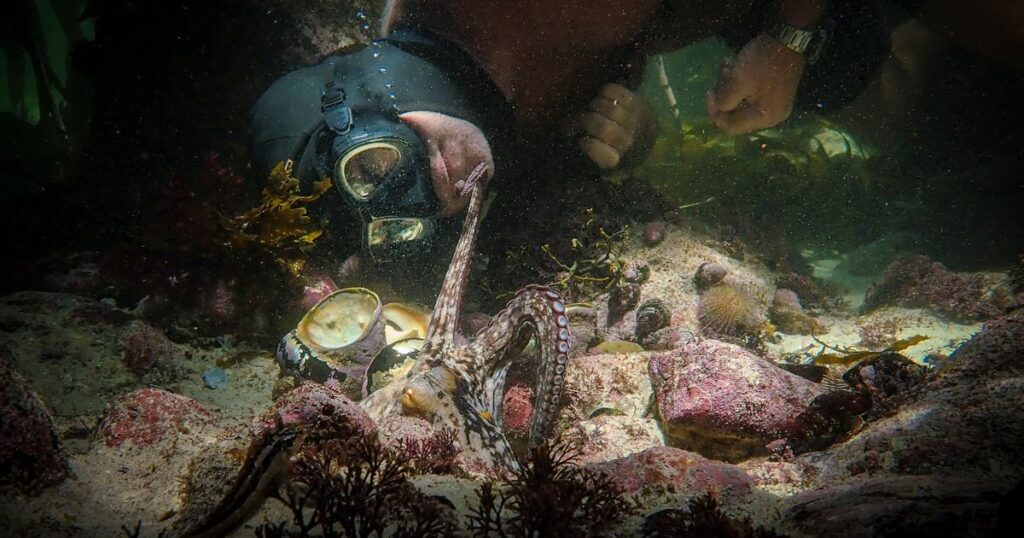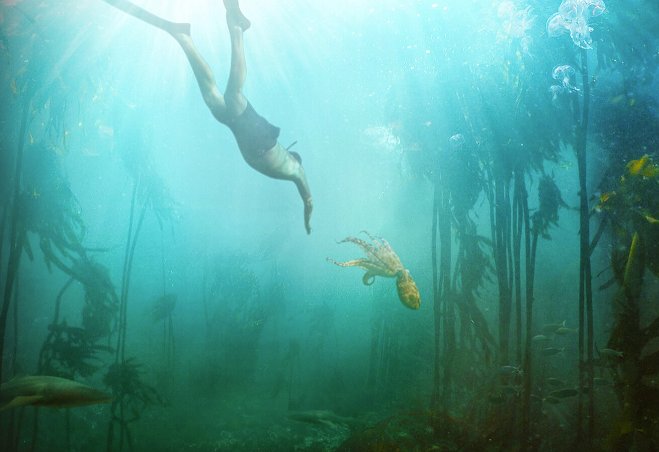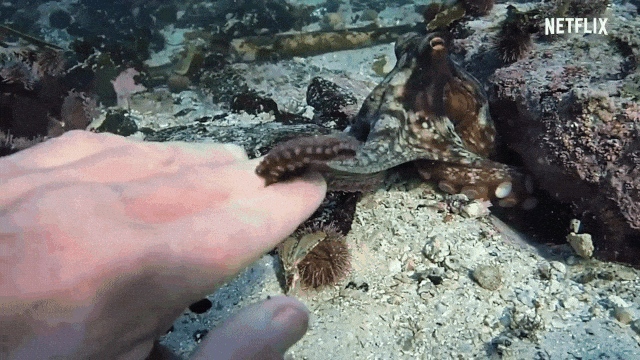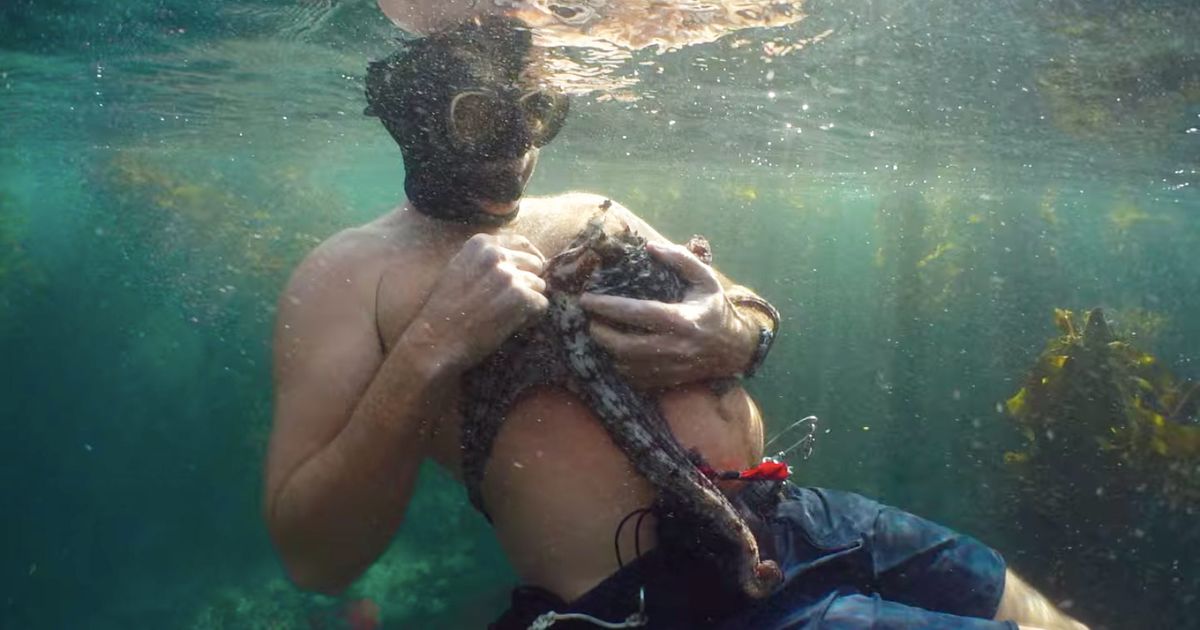
By Victoria Sananikone, Editor in Chief
Photos from Netflix
“When you have that connection with an animal and have those experiences, it’s absolutely mind-blowing. There’s no greater feeling on earth.”
– craig foster, My Octopus Teacher
The connection between humans and animals is extraordinary. Sometimes we bring them into our homes where they become our best friends, companions for life, or beings of support through our dark times. In other circumstances, we simply observe them in their natural habitat. The ways in which animals interact with one another, how they defend themselves, how they hunt for their food, their mating rituals, and how they care for their offspring—these are so easily overlooked. As we watch these animals, we are exposed to the true beauty of what it means to live.
This weekend I was brought to tears as I watched My Octopus Teacher on Netflix. There are so many ways that I could describe this documentary, but if I had to choose one word, it would simply be ‘beautiful.’ This documentary follows Craig Foster, a free diver from South Africa who forms an unusual bond with an animal that you’d least expect: an octopus.
Foster was born on the Southernmost tip of Africa where he spent most of his childhood navigating the rock pools and the kelp forests that lay below his home. He had a deep passion for film and photography, but later, in his adult years, he fell prey to the typical midlife burnout from too much work, a lack of sleep, and a disconnection from his family. The pressure he felt was overwhelming, and he no longer wanted to pick up a camera and continue his love of film.
Foster’s relationship with his son began to suffer, and he knew that he had to reignite a drive for life. He had to revisit his childhood roots by diving back into the freezing waters of the Pacific. Without a scuba tank or a wetsuit, Foster glided through the kelp forests as he observed the creatures of the sea, the ability to hold his breath strengthening each day as he began to crave the cold embrace of the ocean.

“If you really want to get close to an environment like this, it helps tremendously to have no barrier to that environment,” Foster said. “And I suddenly realized I got energy to take images and film again, and then picked up my camera again and started doing the thing I love and what I know.”
Foster encompassed the idea of rediscovering your passion from the place you first fell in love with it.
The day that everything started, Foster dove into the depths of the kelp forest, and he found a strange formation of what looked like a ball of shells and clams. He claims that the fish even seemed to be confused as to what this object was. Suddenly, this mass of mollusks fell from their circular shape as a small octopus emerged from the formation. Foster recounts how the octopus swam away from him and wrapped itself in a cloak of algae, staring at him between her tentacles as she shielded herself with the algae.
“It’s a hard thing to explain, but sometimes you just get a feeling and you know there’s something to this creature that’s very unusual,” Foster said. “There’s something to learn here. There’s something special about her.”
Foster decided that he was going to visit this octopus every day without fail, and that is exactly what he did for an entire year. Throughout this journey, Foster documents the intimate moments that he shares with this octopus, and the footage that he captures of her is incredible. On the first day, Foster approached her den with his camera that he set right in front of her in hopes that she wouldn’t be scared off by his presence. We see footage of this octopus tentatively reaching her tentacles out from her den to touch this shiny, foreign object, her suckers tasting, feeling, and sliding over the lens. She is quite curious of Foster, but cautious.
Foster vividly remembers their first day of contact. As he swam over the octopus, she seems startled by his presence, but then it’s as if she realizes “oh, it’s just him,” and she doesn’t attempt to retreat back to her den. She comes out, curious. Foster films this magical moment as he extends his hand a tiny bit. The octopus reaches out her own tentacle, and we see her arms latching onto his fingers, her suckers walking across his skin. The barrier of fear was now replaced with trust.

Foster continues to visit the octopus every day, and he begins to learn extraordinary things. He witnesses how the octopus can completely change her form by growing spikes on her body and developing horns on her head. We see how she can change the colors, the patterns, and even the texture of her body to camouflage herself anywhere within the ocean.
There are incredibly beautiful moments of connection that Foster shares with this octopus. We see a moment where she climbs onto his hand, covering it with her entire body. Foster explains that he had been under the water for a long time, so he assumed the octopus would move from his hand when he gently pushed off towards the surface. But she didn’t. We see her latched onto Foster’s hand, riding with him towards the surface of the water.
“There I was, just staring into the eyes of this incredible creature,” Foster said.
This octopus ignited a curiosity within Foster that he had never experienced before. When he wasn’t interacting with her in the ocean, he was reading countless scientific papers and studies about octopi. He found that two thirds of her cognition was actually outside of her brain, meaning it was in her tentacles that have 2,000 suckers combined.
“Her entire being is thinking, feeling, exploring,” Foster said. “She’s got 2,000 suckers and she’s using all of them independently. How do you do that? Imagine having 2,000 fingers. You can compare her intelligence to a cat or a dog or even to one of the lower primates. A mollusk shouldn’t be this intelligent.”
This understanding allowed Foster to conclude that this octopus was indeed getting something out of their interactions. This intelligent form of life did not see him as a threat, only as something to observe in return, maybe with some “strange octopus level of joy.”
Foster documented the octopus’s story through it all, during the highs and during the lows. In her greatest moment of need, Foster had to watch in anguish as Pyjama sharks preyed on her, succeeding in ripping off one of her arms. He couldn’t help her, for he would be interfering with the entire process of life and the nature of the ocean. She recovered, and there was a day where Foster found her playing with a school of fish, shooting her arms out repeatedly towards the fish as they darted in different directions. She wasn’t interacting with the fish in the same way she hunted them; he had caught her in a moment of pure fun. She quickly lost interest in the fish after she spotted him, hurrying over to him and latching onto his chest, allowing him to cradle her in his hands as she wrapped her tentacles around him.

In the end, Foster watched as she died. Slowly, she withered away as she began oxygenating her eggs that she laid, eggs that take an enormous amount of an octopus’s life. Foster knew she was never coming back out of her den, but even so, he continued to visit her as she timed her death to match the exact moment her eggs would hatch.
“I mean, it struck home so hard for me,” Foster said. “Here’s an invertebrate, essentially a mollusk, sacrificing her own life for her young.”
During his interview, Foster began to choke back his tears, and in that moment, we could understand just how much he loved this octopus.
“Often, I go to the place of her main den,” Foster said. “And I just float above it and feel her there. Of course, I miss her.”
This little octopus had given so much to Foster. She prompted him to question his own vulnerability. She taught him to become more sensitized to all things living, developing a care for even the smallest animals. He learned how to connect with nature, and he realized just how precious the wild is.
“My relationship with the sea forest and its creatures deepens week after month after year, after year,” Foster said. “You’re in touch with this wild place and it’s speaking to you. Its language is visible.”
He truly understood how vulnerable the lives of animals are, which allowed him to ponder how vulnerable all of our lives on this planet are. He regained a connection with his son, sharing all of the lessons that he learned which drove his son to develop his own love for the ocean. From the connection with this octopus, Craig Foster was no longer the man he once was.
“I fell in love with her, but also with that amazing wildness that she represented and how that changed me,” Foster said. “What she taught me was to feel that you’re part of this place, not a visitor. And that’s a huge difference.”
Thank you so much for sharing this piece. I really enjoyed reading it!
This is great! Now I have to go watch this… 🙂
I fell in love with her too. So sad she died.